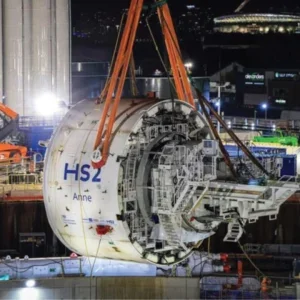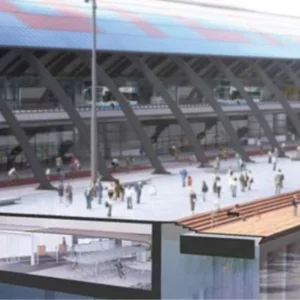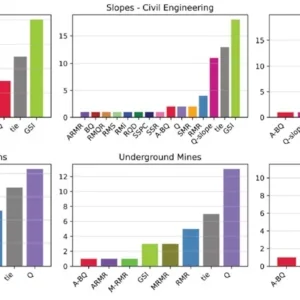W.A. Fairhurst & Partners does not look the most significant entry on Andy Sloan’s curriculum vitae. But the managing director of Donaldson Associates underlines that period in his career as vital to the company’s current relationship with its new owners. Cowi bought Donaldson Associates in 2014 after just three month’s due diligence. The speed of the move was in part thanks to a six-month placement with Cowi that Sloan undertook back in 1995, during the early stages of the Copenhagen Metro.
“That was one of the reasons Cowi were at the top of our list of who we would like to sell to,” says Sloan. “I was impressed with what I saw there. Funnily enough we were at the top of the list of UK companies they were looking at buying.” Having joined the Donaldson board in 1999 Sloan was made a kind of operations director charged with looking at the “delivery of the product”. But the intention when he joined the company was to help founder David Donaldson develop the business from 15 people into an entity that could “undertake large and complex underground and geotechnical projects on a global scale”. By the time the company was sold to Cowi, with a staff of 145, it was a major player in the UK with some overseas work.
Life under Cowi
Preceding the buyout, Donaldson’s had hit a glass ceiling. Largely this was a size issue. Until now Donaldson’s has worked as a sub consultant undertaking technically challenging roles, either for another consultant or taken on directly by a contractor to tackle part of a project. However, the company’s management wants to form joint ventures and gain a seat at what Sloan calls the “top table” with other consultants to fulfil a larger part of major projects. Donaldson’s needed to sell.
As for Cowi, the Danish company was actively trying to strengthen its tunnelling capabilities, but it had specifically been looking at the UK. Already owning Flint & Neill, it had set its sights on purchasing a British tunnelling firm to cement its presence in the market.
A year after being bought out, the mother company decided that worldwide it wanted to consolidate its various companies under the Cowi brand. The five year plan, which also targets a doubling of revenue by the time it concludes in 2020, will see the formation of Cowi UK from 2017. Similarly, Buckland & Taylor, Jenny Engineering and Cowi Marine North America became Cowi North America earlier this year. The new UK-based Cowi will be formed of three parts: Cowi Tunnel (the largest unit), Cowi Bridge and Cowi Marine. The final part still quite small, but the first two are established being based off Donaldson’s and Flint & Neill. Head of Cowi International Lars Hauga will join Andy Sloan of Donaldson’s, Flint & Neill boss David Mackenzie and Hugo Wood of Cowi Marine to form the new board.
There has been a degree of confusion in the last few years over whether clients were dealing with Donaldson Associates or with Cowi. So it was decided that the best move was to adopt the Cowi brand sooner rather than later. According to Sloan, existing customers should experience no difference whatsoever. They will still be dealing with the same people that they have for the past 10 or 20 years and be dealing with the same locations.
As for the staff, he admits that as well as excitement, there is a degree of sadness in seeing the end of the brand. “A lot of my senior staff have been here for many years. Three or four of us are coming up to 20 years in the next year. There is no reticence, but is a degree of sadness in seeing the history go. But we are not going to airbrush it out of existence. There is a strong legacy and the name and history will still be mentioned on websites for just as Steve Hunt has done for Buckland & Taylor in Cowi North America. So while there is sadness, we had reached a glass ceiling as far as the size of the projects we could take on goes. So there is excitement at the opportunities that the rebranding and support of Cowi can bring us.”
International involvement
While Donaldson’s has been involved in international projects before, and has operated an office in Hong Kong since 2010, Sloan has already seen a jump in this area.
“There has been a sea change now in the markets we are looking for and how we interact with other parts of the company. We have colleagues from all over the world in our UK office now, and we are sending our people elsewhere to work on projects all around the world.”
As with the assembly of project teams, the decision on which markets to focus on is also taken collegially. Every quarter there is an international management meeting with 30-35 directors meeting in different parts of the world to discuss the management of the 1,500 Cowi International staff. They identify targets they’re particularly interested in and develop strategies. There are five people running the tunnelling business globally and these people will meet more regularly, being in touch at least once a month.
In terms of cultural clash – Sloan says there hasn’t been any friction but they do share ideas. He points to UK CDM regulations as an example. “Our colleagues around the world are quite interested and willing to listen to why we think CDM is best practice globally. That is, looking at risks inherent in the design from a safety perspective. We are speaking to different areas to spread it.”
Final thoughts
So is the target of doubling revenue achievable? Sloan thinks so. “I think if you break it down into bite-sized chunks and look at the number of people that we need to do that I think I’ve recruited 30 high quality people in this year alone.
One of the benefits of joining Cowi is it has a far greater reach in terms of attracting staff. “Donaldson’s was a brand leader in terms of tunnelling design and geotechnics, but the ability to take a larger chunk of projects, as well as the name, is helping us in attracting staff. So that in itself will help us to reach our targets in 2020, also the numbers of staff that we need to employ to double in size is not astronomical. Part of that doubling is also having a more profitable business. Having more control, being at the top table gives us more control over our financial destiny.”
A principle challenge for this target according to Sloan is the threat to free movement of people posed by the British exit from the European Union.
“I think we have a concern over our ability to move staff around, concern over the degree of nervousness over the recent words and comments coming out of the Conservative Party Conference in relation to the free movement of people is of real risk to the UK industry. We need highly skilled engineers to come to the UK because we’re not producing enough on our own. If all the projects that [are planned for the UK] go ahead, they are obviously all concurrent, and we have a shortage of engineers in the UK. And I simply cannot see how, if we restrict movement of people in the UK, we are going to be able to service these large contracts [as a country]”.






